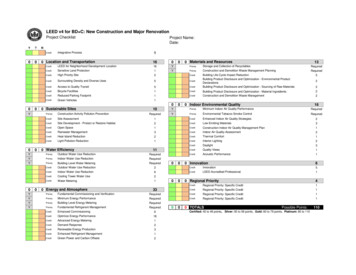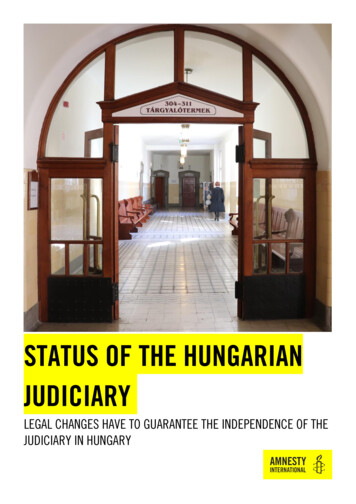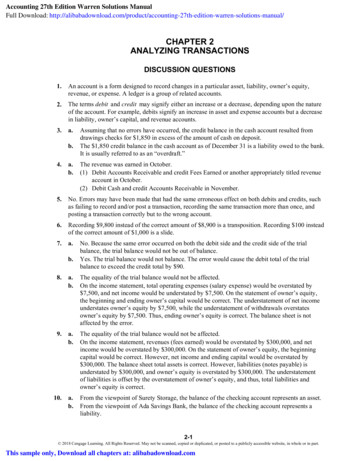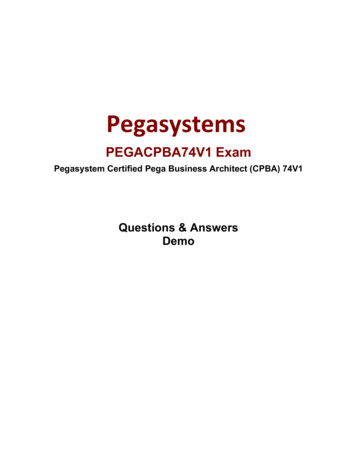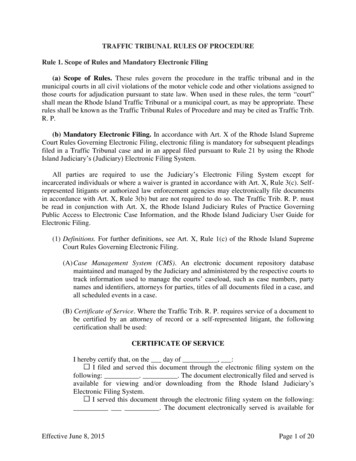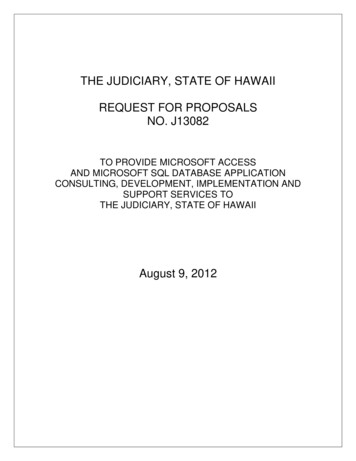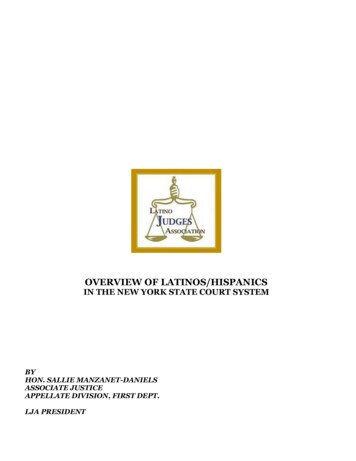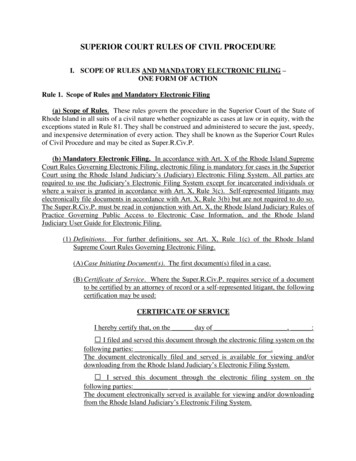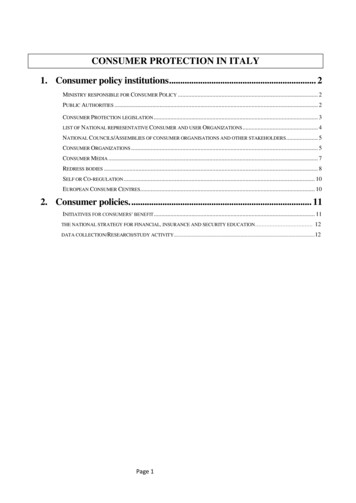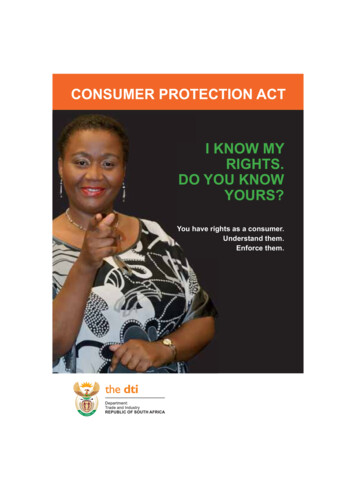
Transcription
Consumer Credit ManualHon. Noach DearWith thanks to the Hon. Peter Sweeney and Hon. Jack A. Battaglia for their comments and to myCourt Attorney, Joseph Etra, for all his hard work in preparing this manual.
I.General InformationA.What is Consumer Credit1.CPLR 105(f) [and NYC CCA 2106(g)]: Consumer credit transaction. Theterm "consumer credit transaction" means a transaction wherein credit isextended to an individual and the money, property, or service which is thesubject of the transaction is primarily for personal, family or householdpurposes.2.GBL 600[1]: "Consumer claim" means any obligation of a natural personfor the payment of money or its equivalent which is or is alleged to be indefault and which arises out of a transaction wherein credit has beenoffered or extended to a natural person, and the money, property or servicewhich was the subject of the transaction was primarily for personal, familyor household purposes. The term included an obligation of a natural personwho is a co-maker, endorser, guarantor or surety as well as the naturalperson to whom such credit was originally extended.3.Broader Definition: Any case in which a judgment is sought against anindividual for credit extended to him or her including, but limited to, creditcards and loans.B.II.Venue1.CPLR 503(f): ''In an action arising out of a consumer credit transactionwhere a purchaser, borrower or debtor is a defendant, the place of trialshall be the residence of a defendant, if one resides within the state or thecounty where such transaction took place, if it is within the state, or, inother cases, as set forth in subdivision (a)."2.Pursuant to CPLR 513, the clerk should reject the consumer creditsummons if venue is incorrect under CPLR 503(f).Common Causes of Action/ Affirmative Defenses/CounterclaimsA.ClaimsI.Breach of Contracta.Generally(1)Elements of breach of contract claim are 1) the existence ofa contract, 2) one party's perfo1mance under the contract, 3)another party's breach of that contract, and 4) resultingdamages (Hampshire Properties v. BTA Bldg. andDeveloping, Inc., 122 A.D.3d 573 [2d Dept 2014]; NewYork State Workers' Compensation Bd. v. SGRisk, LLC,116 A.D.3d 1148, 1153 [3rd Dept 2014]; Niagara Foods,Inc. v. Ferguson Elec. Service Co. , Inc., 111 A.D.3d 1374,1176 [4 1h Dept 2013]; VisionChina Media Inc. v.Shareholder Representative Services, LLC, 109 A.D.3d 49,58 [l5l Dept 2013])2
(2)(3)Existence of Contract(a)A party alleging a breach of contract mustdemonstrate the existence of a contract reflectingthe terms and conditions of the purported agreement(Mandarin Trading Ltd. v. Wildenstein, 16 N. Y.3d173, 182 [2011])" It is axiomatic that a party seeking to recover(b)tmder a breach of contract theory must prove that abinding agreement was made as to all essentialterms. Courts look to the basic elements of the offerand the acceptance to determine whether there is anobjective meeting of the minds sufficient to giverise to a binding and enforceable contract" (Silber v.New York Life Ins. Co., 92 A.D.3d 436, 439 [l 51Dept 2012][citations omitted])(c)"Construction of an unambiguous contract is amatter of law, and the intention of the parties maybe gathered from the four corners of the instrumentand should be enforced according to its terms" (BealSav. Bank v. Sommer, 8 N .Y.3d 318, 324 [2007])(d)"Before rejecting an agreement as indefinite, acourt must be satisfied that the agreement cannot berendered reasonably certain by reference to anextrinsic standard that makes its meaning clear ( 1Williston, Contracts§ 47, at 153-156 [3d ed.1957])." (Cobble Hill Nursing Home, Inc. v. Henryand Warren Corp., 74 N.Y.2d 475, 483 [1989])PerformancePlaintiffs lack of performance is an afiirmative(a)defense that must be pled by D, or else waived(CPLR 3025[a]("(a) Conditions precedent. Theperformance or occurrence of a condition precedentin a contract need not be pleaded. A denial ofperformance or occunence shall be madespecifically and with particularity. In case of suchdenial, the pa1ty relying upon the performance oroccmTence shall be required to prove on the trialonly such performance or occurrence as shall havebeen so specified."])i)If complaint alleges the condition precedentwas met, a "general denial" is sufficient toplace the performance thereof in issue(Allis-Chalmers Mfg. Co. v. Malan Const.3
Corp., 30 N.Y.2d 225, 233 (1972]; Carr vBirnbaum, 75 A.D.3d 972 [3d Dept 2010];1199 Housing Cmp. v. InternationalFidelity Ins. Co., 14 A.D.3d 383, 384 (1 51Dept 2005])(4)b.BreachIn order to state a cause of action to recover(a)damages for a breach of contract, the plaintiffsallegations must identify the provisions of thecontract that were breached (Sutton v. HafnerValuation Group, Inc., 115 A.D.3d 1039, 1042 [3dDept 2014]; New York City Educational Const.Fund v. Verizon New York Inc., 114 A.D.3d 529 [I stDept 2014]; Barker v. Time Warner Cable, Inc., 83A.D.3d 750, 751 [2d Dept 2011])(5)Damages(a)Without a clear demonstration of damages, therecan be no claim for breach of contract (MilanMusic, Inc. v. Emmel Communications Booking,Inc., 37 A.D.3d 206 [1st Dept 2007])Credit Card(1)Use of credit card forms a contr act with the issuer (evenin the absence of a wr itten credit car d agreement).(a)" In the absence of a binding credit agreement, theissuance of the credit card constitutes an offer ofcredit, and the use of the credit card constitutes theacceptance of the offer of credit." (Feder v.FortunofJ; Inc., 123 Misc.2d 857 [Sup Ct, NassauCty 1984]). (This is the venerable precedentgenerally cited for proposition that use of credit cardis acceptance of contract)(2)"The plaintiff made a prima facie showing of entitlement tojudgment as matter of law on its cause of action to recoverdamages for breach of contract. The plaintiff tenderedsufficient evidence that there was an agreement, which thedefendant accepted by her use of the credit card andpayments made thereon, and which was breached by thedefendant when she failed to make required payments"(Citibank (South Dakota), NA. v. Brown-Serulovic, 97A.D.3d 522, 523-524 [2d Dept 2012] [citations omitted];see, similarly, Citibank (South Dakota), NA. v. Keskin, 121A.D.3d 635 [2d Dept 2014); Citibank v Roberts, 304A.D.2d 901 [3rd Dept 2003])4
2.Account Stateda.General Principles:An account stated is an agreement between parties to an(1)account based upon prior transactions between them withrespect to the correctness of the account items and balancedue (see, Roe v. Roe, 117 A.D.3d 1217, 1219, 985N .Y.S.2d 335 [2014]; Haselton Lumber Co., Inc. v. Bette &Cring, LLC, 998 N .Y.S.2d 491, 493 [3rd Dep't 2014]). It isan agreement, independent of the underlying agreement,regarding the amount due on past transactions (G. W White& Son, Inc. v. Gosier, 219 A.D .2d 866, 866, 632 N.Y.S .2d910, 911 (4th Dep't 1995])"[A]n account stated cannot be made an instrument to(2)create liability when none otherwise exists but assumes theexistence of some indebtedness between the parties or anexpress agreement to treat the statement in question as anaccount stated' " (Enviroclean Services, LLC v. Cem, Inc.,12 AD3d 1042, 1043, 785 N.Y.S .2d 641 [4th Dept 2004][citations omitted] ). Thus, "allegedly unfulfilledcontractual conditions precedent to [a] defendant's paymentobligation negate any inference of an implied agreement by[the] defendant that the amounts claimed in plaintiffsinvoices were then due," and preclude the existence of anaccount stated ( see Enviroclean Servs. , LLC v. CEM, Inc.,12 A.D.3d 1042, 1043, 785 N.Y.S .2d 641 [2004] ). Stateddifferently, in order to prevail on a cause of action foraccount stated, the plaintiff must establish the "existence ofsome indebtedness between the parties or an expressagreement to treat the statement in question as an accountstated" (Enviroclean Services, LLC v. Cem, Inc. , 12 A.D.3d1042, 1043, 785 N .Y.S.2d 641 [4th Dept. 2004] [citationsomitted])(3)An account stated may be express or implied. An accountstated will be implied when a party has retained billingstatements without rejecting them or objecting to themwithin a reasonable time under circumstances thus evincingassent to their accuracy (White Plains Cleaning Services,Inc. v. 901 Properties, LLC, 94 A.D.3d 1108, 1109, 942N.Y.S.2d 636, 638 [2nd Dep't 2012]). "[W]here an accountis rendered showing a balance, the party receiving it must,within a reasonable time, examine it and object, if hedisputes its correctness. If he omits to do so, he will bedeemed by his silence to have acquiesced, and will be5
b.bound by it as an account stated, unless fraud, mistake orother equitable considerations are shown" (Peterson v.Schroder Bank & Trust Co., 172 A.D.2d 165, 166, 567N.Y.S.2d 704 [1st Dep't 1991], see also, Haselton LumberCo., Inc. v. Bette & Cring, LLC, 998 N.Y.S.2d 491, 493[3rd Dep't 2014])(4)It is not necessary to establish the reasonableness of theamount owed since a defendant's act of holding the accountstatement without objection will be construed asacquiescence as to its correctness (Cohen Tauber Spievak &Wagner, LLP v. Alnwick, 33 A.D.3d 562, 563, 825N.Y.S.2d 439, 439 - 440 [1st Dep't 2006])(5)There can be no account stated where no account waspresented or where any dispute about the account is shownto have existed (Abbott, Duncan & Wiener v. Ragusa, 214A.D.2d 412, 413, 625 N.Y.S.2d 178, 178 [1st Dep't 1995]).(6)The question of whether there is an account stated is one oflaw (Peterson v. !BJ Schroder Bank & Trust Co., 172A.D.2d 165, 167, 567 N.Y.S.2d 704, 705 [1st Dep't 1991])Prima Facie Case:(1)A plaintiff establishes a prima facic entitlement tojudgment as a matter of law on a cause of action to recoveron an account stated by tendering sufficient evidence that itgenerated account statements for the defendant in theregular course of business, that it mailed those statementsto the defendant on a monthly basis, and that the defendantaccepted and retained these statements for a reasonableperiod of time without objection (see, Citibank (SouthDakota), NA. v. Keskin , 121 A.D.3d 635, 636, 993N.Y.S.2d 343, 344 [2nd Dep't 2014]). Plaintiff is notrequired to submit a signed credit card application in orderto establish its claim based on an account stated ( see,Citibank (SD) NA. v. Reine, 14 Misc.3d 130[A], 2007 N.Y.Slip Op 50013[U])(2)Mailing:(a)Typically, a plaintiff establishes that a defendanthad received an account statement by submittingproper proof of mailing. "Generally, proof ofproper mailing gives rise to a presumption that theitem was received by the addressee . Thepresumption may be created by either proof ofactual mailing or proof of a standard office practiceor procedure designed to ensure that items are6
3.properly addressed and mailed" (ResidentialHolding Corp. v. Scottsdale Ins. Co., 286 A.D.2d679, 680, 729 N.Y.S.2d 776 [2d Dept. 2001]).Generally, a plaintiff fails to establish, prima facie,a cause of action for an account stated in theabsense of sufficient proof of mailing (see,Morrison Cohen Singer & Weinstein, LLP v.Brophy,19 A.D.3d 161, 162, 798 N.Y.S.2d 379, 380- 381 [1st Dep't 2005]; Discover Bankv.Williamson, 4 Misc.3d 136(A), 2007 N.Y. Slip Op.5023l(U) [App Term, 9th & 10th Jud. Dists.];Citibank (SD) NA. v. Goldberg, 24 Misc.3d 143(A),2009 N.Y. Slip Op. 5 l 735(U) [App Term, 2nd, 11th& 13th Jud. Dists.])(3)Retention without Objection:(a)Where plaintiff fails to submit evidentiary proof thatthe defendant retained the billing statements for anunreasonable period of time without objecting tothem, the plaintiff fails to meet its prima facieburden (see, Citibank (South Dakota), NA . v.Brown-Serulovic, 97 A.D.3d 522, 523, 948N.Y.S.2d 331 , 332 [2nd Dep't 2012]; RaytonePlumbing Specialities, Inc. v. Sano Const. Corp., 92A.D.3d 855, 856, 939 N.Y.S.2d 116, 118 [2nd Dep't2012]; American Express Centurion Bank v. Cutler,81 A.D.3d 761 , 916 N.Y.S.2d 622 [2nd Dep't2011])(b)"Whether a bill has been held without objection fora period of time sufficient to give rise to aninference of assent, in light of all the circumstancespresented, is ordinarily a question of fact, andbecomes a question of law only in those caseswhere only one inference is rationally possible"(Leo J Roth Corp. v. Trademark Development Co.,Inc. 90 A.D.3d 1579, 1581, 935 N.Y.S.2d 780, 782- 783 [4th Dep't 2011], citing, Legum v. Ruthen, 211A.D.2d 701, 703, 621 N.Y.S.2d 649 [2nd Dep't1995])Unjust Enrichmenta.Elements(1)To prove a claim of unjust enrichment, "[a] plaintiff mustshow that (1) the other party was enriched, (2) at that party'sexpense, and (3) that it is against equity and good7
B.conscience to permit the other party to retain what is soughtto be recovered " ( lvfandarin Trading Ltd v. Wildenstein,16 N. Y.3d 173, 182 [2011 ][citations and internal quotationmarks omitted]).b.Unavailable if there is a contract(1)"[A] party may not recover in . unjust enrichment wherethe parties have entered into a contract that governs thesubject matter" (Cox v NAP Constr. Co., Inc., 10 N.Y.3d592, 607 (2008] ).(2)However, where "the existence of the contract is in dispute,the plaintiff may allege causes of action to recover forunjust enrichment and in quantum meruit as alternatives toa cause of action alleging breach of contract" (ThompsonBros. Pile Corp. v. Rosenblum, 121 A.D.3d 672 [2d Dept2014])Affirmative Defenses1.Personal Jurisdictiona.CPLR 3211 (e) states in relevant part, "an objection that thesummons and complaint, summons with notice, or notice ofpetition and petition was not properly served is waived if, havingraised such an objection in a pleading, the objecting party does notmove for judgment on that ground within sixty days after servingthe pleading, unless the court extends the time upon the ground ofundue hardship."b.CPLR 308 [Service]( 1)Generally(a)Process server's sworn affidavit ordinarily createsprima facie evidence of proper service. If there is adetailed, sworn denial that delivery wasaccomplished, the affidavit of service is rebuttedand the plaintiff must establish jurisdiction by apreponderance of the evidence at a hearing.(Machovec v Svoboda, 120 A.D.3d 772 [2d Dept2014]; Cellino & Barnes, P.C. v Martin, Lister &Alvarez, PLLC, 117 A.D.3d 1459, 1460 [4111 Dept2014]; TD Banknorth, NA. v Olsen, 112 A.D.3d1169 (3d Dept 2013])(b)A process server's sworn affidavit of serviceordinarily constitutes prima facie evidence of properservice pursuant to CPLR 308 (2). Where, however,as in this case, there is a sworn denial that deliveryto the defendant was accomplished, the affidavit ofservice is rebutted and the plaintiff must establish8
(c)(2)jurisdiction by a preponderance of the evidence at ahearing. Even if a defendant eventually acquiresactual notice of the lawsuit, actual notice alone willnot sustain the service or subject a person to thecourt's jurisdiction when there has not beencompliance with prescribed conditions of service .A defendant can rebut a process server's affidavitby a detailed and specific contradiction of theallegations in the process server's affidavit (BankersTrust Co. OfCal., NA . v Tsoukas, 303 AD2d 343,344 [2d Dept 2003])"Although a defendant's sworn denial of receipt ofservice generally rebuts the presumption of properservice established by the process server's affidavitand necessitates an evidentiary hearing, no hearingis required where the defendant fails to swear tospecific facts to rebut the statements in the processserver's affidavits" (NYCTL 2009-A Trust vTsafatinos, 101 A.D.3d 1092 [2d Dept 2012)[citations and internal quotation marks omitted]; seealso Associates First Capital Corp. v Wiggins, 75A.D.3d 614 [2d Dept 2010] ["since the defendants'affidavits amounted to no more than bare andconclusory denials of service which wereinsufficient to rebut the prima facie proof of properservice . created by the process server's affidavit,no hearing was required"]; Ce/lino & Barnes, P.C. vMartin, Lister&Alvarez, PLLC, 117 A.D.3d 1459,1460 [41h Dept 2014]).308(1)(a)"Personal service upon a natural person shall bemade by any of the following methods: 1. bydelivering the summons within the state to theperson to be served" (CPLR 308[1])A sworn denial of receipt alone is insufficient to(b)rebut the process server's affidavit (Deutsche BankNat. Trust Co. v. Quinones, 114 A.D.3d 719 [2dDept 2014])(c)A defendant's affidavit denying that she was everserved pursuant to CPLR 308(1) and setting forthsignificant discrepancies between the processserver's physical description of her and her actual9
physical appearance is sufficient to rebut the processserver's affidavit and necessitate a traverse hearing.(Wells Fargo Bank, NA. v. Final Touch Interiors,LLC, 112 A.D.3d 813, 815 [2d Dept 2013])(3)308 (2)(a)Generallyi)"Personal service upon a natural person shallbe made by any of the following methods: .2. by delivering the summons within thestate to a person of suitable age anddiscretion at the actual place of business,dwelling place or usual place of abode of theperson to be served and by either mailing thesummons to the person to be served at his orher last known residence or by mailing thesummons by first class mail to the person tobe served at his or her actual place ofbusiness in an envelope bearing the legend"personal and confidential" and notindicating on the outside thereof, by returnaddress or otherwise, that thecommunication is from an attorney orconcerns an action against the person to beserved, such delivery and mailing to beeffected within twenty days of each other"(CPLR 308[2]).ii)Service pursuant to CPLR 308(2) is notcomplete until 10 days after filing proof ofservice (Id)iii)"CPLR 308(2) requires strict complianceand the plaintiff has the burden of proving,by a preponderance of the credible evidence,that service was properly made" (Samuel v.Brooklyn Hosp. Center, 88 A.D.3d 979, 980(2d Dept 2011])iv)Jurisdiction is not acquired pursuant toCPLR 308(2) unless both the delivery andmailing requirements have been strictlycomplied with. However, a minor error inthe address to which a summons is mailedwill not render service of process void where"it is virtually certain that the summons willarrive" at its intended destination10
(b)(c)(Gray-Joseph v Shuhai Liu, 90 A.D.3d 988[2d Dept 2011] [internal citations omitted])v)A general statement by the alleged "personof suitable age and discretion" that she neverreceived the summons and complaint isalone insufficient to warrant a traversehearing. (Caba v Rai, 63 A.D.3d 578, 583[l st Dept 2009])Person of Suitable Age and Discretioni)"The defendant's failure to recall the personof suitable age and discretion who wasserved, without specific facts of the identityof his employees, employment records,payroll records, or affidavits from others,fails to rebut the process server's affidavit "(Stephan B. Gleich & Assoc. v Gritsipis, 87A.D.3d 216, 221 [2d Dept 2011 ])ii)Claim that the there was no one residing atthe service address on the date of servicemeeting the description of the personallegedly served is insufficient to rebut thepreswnption that service was proper as sucha claim does not mean that the persondescribed in the affidavit of service was notpresent at the place and time specified on theaffidavit of service (Roberts v Anka, 45A.D.3d 752, 753 [2d Dept 2007])Dwelling Place or Usual Place of Abodei)The usual place of abode is determinedbased on its permanence and stability.Relevant information includes (but is notlimited to) the address provided byDefendant to the Post Oftice, DMV, bank,employer, etc., the address associated withthe phone listed in the person's name, andwhether the person established a more recentpermanent address. (Argent Mtge. Co., LLCv Vlahos, 66 A.D.3d 721 [2d Dept 2009];Merchants Ins. Group v Coutrier, 59 A.D.3d602, 603 [2d Dept 2009])ii)The outer bounds of the actual dwellingplace must be deemed to extend to thelocation at which the process server's11
(d)(e)(f)progress is arrested (such as by an apartmenthouse doorman) (F. I. duPont, Glore Forgan& Co. v. Chen, 41 N.Y.2d 794, 797 [1977))Actual Place of Businessi)"CPLR 308(2) pennits personal service on anatural person 'by delivering the summonswithin the state to a person of suitable ageand discretion at the actual place ofbusiness' of the person to be served and,within 20 days thereafter, mailing a copy ofthe summons to the actual place of businessin a specified manner (CPLR 308[2] ).(Samuel v. Brooklyn Hosp. Center, 88A.D.3d 979, 980 [2d Dept 2011))ii)"A person's 'actual place of business' mustbe where the person is physically presentwith regularity, and that person must beshown to regularly transact business at thatlocation" (Selmani v. City ofNew York, 100A.D.3d 861 [2d Dept 2012))Doormani)Plaintiff satisfied its burden of establishingpersonal jurisdiction overdefendant-appellant (defendant), pursuant toCPLR 308(2). At the traverse hearing, theprocess server testified that, after attemptingto personally serve defendant and herhusband at their apartment building, hedelivered the pleadings to the building'sdoorman, a "person of suitable age anddiscretion" (2110-2118 ACBP v.Holland-Harden, 118 A.D.3d 461[151 Dept2014))ii)Service upon the doorman of defendants'apartment building was proper under CPLR308(2), given that the process server wasdenied access to defendants' apartment(Bank ofAmerica, NA. v. Grujferman, 117A.D.3d 508 [1 51 Dept 2014])Timelinessi)Both the service and the mailing must bemade within the 120 day period of CPLR306-b (Qing Dong v Chen Mao Kao, 11512
(4)A.D.3d 839, 840 [2d Dept 2014])308(4)(a)"Personal service upon a natural person shall bemade by any of the following methods: . 4. whereservice under paragraphs one and two cannot bemade with due diligence, by affixing the summonsto the door of either the actual place of business,dwelling place or usual place of abode within thestate of the person to be served and by eithermailing the summons to such person at his or herlast known residence or by mailing the summons byfirst class mail to the person to be served at his orher actual place of business in an envelope bearingthe legend "personal and confidential" and notindicating on the outside thereof, by return addressor otherwise, that the communication is from anattorney or concerns an action against the person tobe served, such affixing and mailing to be effectedwithin twenty days of each other" (CPLR 308[4])i)"Service pursuant to CPLR 308(4),commonly known as "nail and mail" service,may be used only where service under CPLR308(1) or 308(2) cannot be made with "duediligence" (Estate of Waterman v Jones, 46AD3d 63, 65 [2d Dept 2007])(b)Service pursuant to CPLR 308(4) is not completeuntil 10 days after filing proof of service (CPLR308[4])(c)Need due diligencei)There is no hard-and-fast rule as to whatconstitutes due diligence. It is a casespecific analysis.a)"This Court has repeatedlyemphasized that 'the due diligencerequirement of CPLR 308(4) must bestrictly observed, given the reducedlikelihood that a summons servedpursuant to that section will bereceived'. What constitutes duediligence is determined on acase-by-case basis, focusing not onthe quantity of the attempts atpersonal delivery, but on their quality13
(McSorley v Spear, 50 AD3d 652,653 [2d Dept 2008][citationsomitted]).b)"Although "due diligence" is notdefined in the statutory framework,the term has been interpreted andapplied on a case-by-case basis.[T]he due diligence requirementrefers to the quality of the effortsmade to effect personal service, andcertainly not to their quantity orfrequency . "due diligence" may besatisfied with a few visits ondifferent occasions and at differenttimes to the defendant's residence orplace of business when the defendantcould reasonably be expected to befound at such location at those times.For the purpose of satisfying the"due diligence" requirement ofCPLR 308(4), it must be shown thatthe process server made genuineinquiries about the defendant'swhereabouts and place ofemployment, given the reducedlikelihood that a summons servedpursuant to [nail and mail service]will be received. (Estate ofWaterman v Jones, 46 AD3d 63, 65[2d Dept 2007](citations and internalquotation marks omitted]).The process server must make a good faitheffort to locate both the dwelling andbusiness address of defendant in order toattempt to effectuate personal or substituteservicea)For the purpose of satisfying the"due diligence" requirement ofCPLR 308(4), it must be shown thatthe process server made genuineinquiries about the defendant'swhereabouts and place ofemployment (Cadlerock Jointii)14
iii)15Venture, L.P. v Kierstedt, 119A.D .3d 627 [2d Dept 2014]; Estateof Waterman v Jones, 46 AD3d 63,65 [2d Dept 2007])Attempts at Dwelling Only Upheld in SomeCasesa)"Contrary to the appellant'scontention, the process server'suncontradicted testimony that hemade three attempts to effectpersonal service at the appellant'sresidence at different times ondifferent days, including a Saturday,were sufficient to satisfy the "duediligence" requirement of CPLR308(4)" (Wells Fargo Bank, NA. v.Cherot, 102 A.D.3d 768 [2d Dept2013]; see., similarly, Deutsche BankNatl. Trust Co. v White, I IO A.D.3d759, 760 [2d Dept 2013]; JPMorganChase Bank, NA. v. Szajna, 72A.D.3d 902 [2d Dept 2010])b)"Under the circumstances of thiscase, the affidavit, which stated thatthe process server attempted to serveMappa at his dwelling at differenttimes and on different days, wassufficient to meet the "due diligence"requirement of CPLR 308(4).Furthermore, since there was noevidence that Mappa was employed,the plaintiff was not required toattempt to serve Mappa at his placeof business" (State v. Mappa, 78A.D.3d 926 [2d Dept 2010][citationsomitted])c)"Plaintiffs process server'ssuccessive attempts to servedefendants personally at varioustimes of the day when it could bereasonably expected that they wouldbe at home satisfied the duediligence requirement of CPLR
d)e)f)g)16308(4) so as to permit nail-and-mailservice . Nor was it necessary thatthe process server, before resorting tonail-and-mail, attempt to servedefendants at their place of business»(Farias v Simon, 73 A.D.3d 569, 570[151 Dept 2010])"Where four attempts to serve thedefendant at his residence includedan attempt on a late weekday eveningand an attempt on an early Saturdaymorning, it was not necessary thatthe plaintiff, County of Nassau,attempt to serve the defendant at hisworkplace" (County of Nassau vGallagher, 43 AD3d 972, 973-974[2d Dept 2007]).Weekday attempts at 7:30 AM, 7:15PM, and 10: 10 AM coupled withconfirming the home address with aneighbor sufficient (State ofNYHigher Educ. Servs. Corp. vSparozic, 35 A.D.3d 1069, 1070 [3dDept 2006])''Contrary to the defendant'scontention, the Supreme Courtproperly concluded that the threeattempts made by the plaintiffs'process server to personally servehim at his residence satisfied the duediligence requirement" (Lemberger vKhan, 18 AD3d 447 [2d Dept2005])."The three attempts to make serviceof the summons and complaint uponthe defendant at his residence atdifferent times and on different days,including a Saturday, were sufficientto constitute due diligence ( see,Matos v. Knibbs, 186 A.D.2d 725,588 N.Y.S.2d 911). Since there wasno indication that he worked onSaturdays, there was no showing of
any other reasonable means wherebythe chances of successful personalservice could have been significantlyincreased ( see, Matos v. Knibbs,supra)." (Johnson v. Waters, 291A.D.2d 481 [2d Dept 2002]).(d)c."Actual place of business, dwelling place or usualplace of abode" are defined, supra.i)Although the required subsequent mailingmay be sent to the defendant's last knownresidence, affixing process to the door ofthe defendant's last known residence will notbe sufficient to meet the first element of thestatute (Olscamp v Fasciano, 118 A.D.3d1472 [41h Dept 2014]; Kalamadeen v. Singh,63 A.D.3d 1007, 1008 [2d Dept 2009])ii)Attaching to outer door/fence is allowedunder limited circumstance (F I duPont,Glore Forgan & Co. v. Chen, 41 N.Y.2d794, 798 [ 1977] ["In our analysis if a processserver is not permitted to proceed to theactual apartment . the outer bounds of theactual dwelling place must be deemed toextend to the location at which the processserver's progress is arrested"]; AlbertWagner & Son, Inc. v. Schreiber, 210A.D .2d 143 [1 ST Dept 1994] [affixing toinner foyer door of apartment buildingdeemed sufficient when server could get nofurther]; Res Land, Inc. v. SHS Baisley,LLC, 33 Misc.3d 128[A], 2011 N.Y. SlipOp. 51847[U] [App Term 2nd, 11th and13th Judicial Districts 201 l][upholdingservice where affixed to fence aroundproperty when could not gain entry])Waiver( 1)Through Appearance in the case(a)"An appearance by a defendant in an action isdeemed to be the equivalent of personal service of asummons upon him [or her], and therefore conferspersonal jurisdiction over him [or her], unless he [or17
she] asserts an objection to jurisdiction either byway of motion or in his [or her] answer. By statute,a party may appear in an action by attorney (CPLR321), and such an appearance constitutes anappearance by the party for purposes of conferringjurisdiction" (Countrywide Home Loans Servicing,LP v. Albert, 78 AD3d 983, 984 [2d Dept 2010][citations and internal quotation marks omitted).(b)(2)A party appears in an action either formally, byserving and filing notice of appearance or answer orby making motion that serves to extend time toanswer, or informally, by participating in the meritsof an action without raising any jurisdictionalobjection (NYCTL 1998-1 Trust v. Pro! PropertiesCorp, 18 A.D.3d 525 [2d Dept 2005]; USF & G. v.Maggiore, 299 AD3d 341, 343 [2d Dept 2002]).Failure to Move For Dismissal Within 60 Days of Filing theAnswer(a)CPLR 321 l(e) states in relevant part: "an objectionthat the summons and complaint . was not properlyserved is waived if, having raised such an objectionin a pleading, the objecting party does not m
A. What is Consumer Credit 1. CPLR 105(f) [and NYC CCA 2106(g)]: Consumer credit transaction. The term "consumer credit transaction" means a transaction wherein credit is extended to an individual and the money, property, or service which is the subject of the transaction is primarily for personal, family or household purposes. 2.
